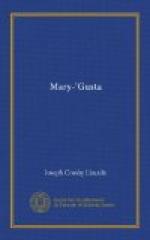“Well, Mary,” he said, “I think I can promise that if I answer your questions at all I shall answer them truthfully. But I scarcely like to promise to answer them without knowing what they are. A lawyer has a good many secrets intrusted to him and he is obliged to be careful.”
“I know. But this is a secret in which I am interested. I am interested in it more than anyone else. I must know the truth about it! I must! If you won’t tell me I shall find out somehow. Will you tell?”
Judge Baxter rubbed his chin again.
“Don’t you think you had better ask your questions?” he suggested.
“Yes; yes, I do. I will. How much money did my stepfather, Captain Marcellus Hall, have when he died?”
The Judge’s chin-rubbing ceased. His eyebrows drew together.
“Why do you want to know?” he asked, after a moment.
“Because I do. Because it is very important that I should. It is my right to know. Was he a rich man?”
“Um—er—no. I should not call him that. Hardly a rich man.”
“Was he very poor?”
“Mary, I don’t exactly see why—”
“I do. Oh, Judge Baxter, please don’t think I am asking this for any selfish reasons. I am not, indeed I’m not! All my life, ever since I was old enough to think of such things at all, I have supposed—I have been led to believe that my stepfather left me plenty of money—money enough to pay my uncles for taking care of me, for my clothes and board, and now, during these last two years, for my studies in Boston. I never, never should have consented to go to that school if I hadn’t supposed I was paying the expenses myself. I knew my uncles were not well-to-do; I knew they could not afford to—to do what they had already done for me, even before that. And now—last night—I was told that—that they were in great financial trouble, that they would probably be obliged to fail in business, and all because they had been spending their money on me, sacrificing themselves and their comfort and happiness in order that ‘an adopted niece with extravagant ideas’ might be educated above her station; that is the way the gentleman who told me the story put it. Of course he didn’t know he was talking to the niece,” she added, with a pathetic little smile; “but, oh, Judge, can’t you see now why I must know the truth—all of the truth?”
Her fingers clasped and unclasped in her lap. The Judge laid his own hand upon them.
“There, there, my dear,” he said soothingly. “Tut, tut, tut! What’s all this about your uncles failing in business? That isn’t possible, is it? Tell me the whole thing, just as it was told to you.”
So Mary told it, concluding by exhibiting Isaiah Chase’s letter.
“It must be very bad, you see,” she said. “Isaiah never would have written if it had not been. It is hard enough to think that while I was enjoying myself in Europe and at school they were in such trouble and keeping it all to themselves. That is hard enough, when I know how they must have needed me. But if it should be true that it is their money—money they could not possibly spare—that I have been spending—wasting there in Boston, I—I—Please tell me, Judge Baxter! Have I any money of my own? Please tell me.”




